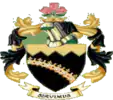Prince Albert Local Municipality
Prince Albert Municipality is a municipality located in the Western Cape Province of South Africa.
Prince Albert | |
|---|---|
 Seal | |
.svg.png.webp) Location in the Western Cape | |
| Coordinates: 33°00′S 22°00′E | |
| Country | South Africa |
| Province | Western Cape |
| District | Central Karoo |
| Seat | Prince Albert |
| Wards | 4 |
| Government | |
| • Type | Municipal council |
| • Mayor | Goliat Lottering |
| Area | |
| • Total | 8,153 km2 (3,148 sq mi) |
| Population (2011)[2] | |
| • Total | 13,136 |
| • Density | 1.6/km2 (4.2/sq mi) |
| Racial makeup (2011) | |
| • Black African | 2.8% |
| • Coloured | 84.5% |
| • Indian/Asian | 0.3% |
| • White | 11.8% |
| First languages (2011) | |
| • Afrikaans | 93.5% |
| • English | 3.6% |
| • Other | 2.9% |
| Time zone | UTC+2 (SAST) |
| Municipal code | WC052 |
Geography
The municipality covers an area of 8,153 square kilometres (3,148 sq mi) in the Great Karoo, immediately north of the Swartberg mountains. It abuts on the Beaufort West Municipality to the north, the Baviaans Municipality to the east, the Oudtshoorn and Kannaland Municipalities to the south, and the Laingsburg Municipality to the west.
According to the 2011 census the municipality has a population of 13,136 people in 3,578 households. Of this population, 84.5% describe themselves as "Coloured", 11.8% as "White", and 2.8% as "Black African". The first language of 93.5% of the population is Afrikaans, while 3.6% speak English and 0.9% speak Xhosa.[4]
The main town in the municipality is Prince Albert, which as of 2011 has a population of 7,054. North of Prince Albert on the N1 national road is the village of Leeu-Gamka (pop. 2,727), while Klaarstroom (pop. 584) is to the east of Prince Albert at the mouth of Meiringspoort.[5]
Politics
The municipal council consists of seven members elected by mixed-member proportional representation. Four councillors are elected by first-past-the-post voting in four wards, while the remaining three are chosen from party lists so that the total number of party representatives is proportional to the number of votes received. In the election of 18 May 2016 no party obtained a majority of seats; the Democratic Alliance (DA) won three seats, while the Karoo Gemeenskap Party (KGP) and the African National Congress won two each. The DA and the KGP formed a coalition to govern the municipality.[6]
The following table shows the results of the 2016 election.[7][8][9]
| Party | Votes | Seats | ||||||
|---|---|---|---|---|---|---|---|---|
| Ward | List | Total | % | Ward | List | Total | ||
| Democratic Alliance | 1,848 | 1,845 | 3,693 | 33.5% | 1 | 2 | 3 | |
| Karoo Gemeenskap Party | 1,759 | 1,823 | 3,582 | 32.5% | 2 | 0 | 2 | |
| ANC | 1,775 | 1,709 | 3,484 | 31.6% | 1 | 1 | 2 | |
| Independent Civic Organisation | 50 | 50 | 100 | 0.9% | 0 | 0 | 0 | |
| Economic Freedom Fighters | 37 | 45 | 82 | 0.7% | 0 | 0 | 0 | |
| Freedom Front Plus | 37 | 37 | 74 | 0.7% | 0 | 0 | 0 | |
| Total | 5,506 | 5,509 | 11,015 | 4 | 3 | 7 | ||
| Valid votes | 5,506 | 5,509 | 11,015 | 98.7% | ||||
| Spoilt votes | 73 | 73 | 146 | 1.3% | ||||
| Total votes cast | 5,579 | 5,582 | 11,161 | |||||
| Voter turnout | 5,582 | |||||||
| Registered voters | 7,386 | |||||||
| Turnout percentage | 75.6% | |||||||
The local council sends one representative to the council of the Central Karoo District Municipality. As of February 2017 that councillor is from the Karoo Gemeenskap Party.[6]
References
- "Contact list: Executive Mayors". Government Communication & Information System. Archived from the original on 14 July 2010. Retrieved 22 February 2012.
- "Statistics by place". Statistics South Africa. Retrieved 27 September 2015.
- "Statistics by place". Statistics South Africa. Retrieved 27 September 2015.
- "Prince Albert Local Municipality". Census 2011.
- G. Ross: Romance of Cape Mountain Passes. New Africa Books. 2004. ISBN 0864866631, 9780864866639. p.89.
- "Political composition of councils February 2017" (PDF). Western Cape Department of Local Government. February 2017. Retrieved 4 June 2017.
- "Results Summary – All Ballots: Prince Albert" (PDF). Electoral Commission. Retrieved 5 June 2017.
- "Seat Calculation Detail: Prince Albert" (PDF). Electoral Commission. Retrieved 5 June 2017.
- "Voter Turnout Report: Prince Albert" (PDF). Electoral Commission. Retrieved 5 June 2017.
.svg.png.webp)
.svg.png.webp)